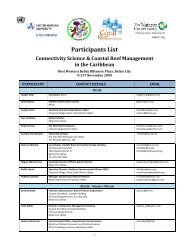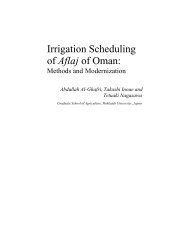The Global Water Crisis: Addressing an Urgent Security - Unu-inweh ...
The Global Water Crisis: Addressing an Urgent Security - Unu-inweh ...
The Global Water Crisis: Addressing an Urgent Security - Unu-inweh ...
Create successful ePaper yourself
Turn your PDF publications into a flip-book with our unique Google optimized e-Paper software.
c<strong>an</strong>not rely on constitutional water rights to bring <strong>an</strong> action against those who pollute or deplete natural sources of water.<br />
Instead, they must rely on other legal rights if they exist, such as common law actions in nuis<strong>an</strong>ce or ripari<strong>an</strong> rights, or<br />
unreliable regulatory actions of government.<br />
2.2. Does not increase water resources<br />
<strong>The</strong> declaration of hum<strong>an</strong> rights to water does not increase the natural amount of water available. A country short of water<br />
will still be short after a hum<strong>an</strong> right to water is constitutionally declared. Constitutional provisions may bind governments,<br />
but they c<strong>an</strong>not ch<strong>an</strong>ge ecosystems or water cycles. Unlike wealth, which c<strong>an</strong> grow <strong>an</strong>d be multiplied, the amount of<br />
fresh water in a country is limited to its natural supply, unless energy-intensive desalination is used or water is imported.<br />
2.3. Exacerbates scarcity<br />
Ideally, the price of commodified water should reflect its market value (Zetl<strong>an</strong>d, 2011). Where water is plentiful, supply<br />
may exceed dem<strong>an</strong>d <strong>an</strong>d therefore c<strong>an</strong> be expected to be cheap. In some places, water may be scarce, <strong>an</strong>d therefore<br />
expensive. Hum<strong>an</strong> rights to water are usually defined to me<strong>an</strong> that citizens have the right to be provided with water that<br />
is free or is available at nominal cost. Consumers of commodities, including water, respond to price: lower price leads to<br />
higher dem<strong>an</strong>d. When water is free, there is no reason to conserve or minimize the amount of water used. Where water<br />
is scarce, providing water for free will ensure that dem<strong>an</strong>d outstrips supply.<br />
Maintaining water markets c<strong>an</strong> be difficult. <strong>Water</strong> treatment <strong>an</strong>d supply systems are regarded as ‘natural monopolies’<br />
because constructing multiple sets of parallel pipes underneath cities to compete with each other is not feasible. Competing<br />
sources of cle<strong>an</strong>, municipal drinking water are thus unlikely to emerge. However, monopolies do not work well, regardless<br />
of whether the monopoly is public or private. <strong>The</strong>y are seldom efficient, effective or responsive to their customers’ desires,<br />
<strong>an</strong>d may charge excessive prices because there is no competition to set a market price. But going to the other extreme<br />
of making water free or artificially cheap is equally distorting.<br />
If there is no market to set price, legislated rules c<strong>an</strong> require price to reflect cost of provision <strong>an</strong>d scarcity, thereby coming<br />
as close as possible to reproducing the dynamics of supply <strong>an</strong>d dem<strong>an</strong>d. Regulation of drinking water should be arm’slength<br />
<strong>an</strong>d free from conflicts of interest. In <strong>an</strong> ideal system, the operation of water treatment pl<strong>an</strong>ts <strong>an</strong>d pipelines is<br />
separate from the supervision of the system, which in turn is separate from the setting of rules <strong>an</strong>d st<strong>an</strong>dards that the<br />
system is expected to meet.<br />
2.4. Not <strong>an</strong> enforceable guar<strong>an</strong>tee<br />
At first gl<strong>an</strong>ce, the South Afric<strong>an</strong> right to water appears to guar<strong>an</strong>tee that everyone will be provided with a sufficient supply.<br />
However, it has neither that legal me<strong>an</strong>ing nor that practical effect. <strong>The</strong> full text of the right to water in Section 27 reads:<br />
“Everyone has the right to have access to … sufficient food <strong>an</strong>d water … <strong>The</strong> state must take reasonable<br />
legislative <strong>an</strong>d other measures, within its available resources, to achieve the progressive realisation of each<br />
of these rights.” (Constitution of the Republic of South Africa, 1996).<br />
Rather th<strong>an</strong> creating <strong>an</strong> obligation to supply water, this constitutional provision obligates government to develop policies<br />
towards that end (Mazibuko, 2009: para. 50). Further, the government’s responsibility is limited by the resources that are<br />
available to it for this purpose (Mazibuko, 2009: para. 49). Policies may be designed to achieve the progressive realization<br />
of water access, which me<strong>an</strong>s that they need not achieve the objective immediately or at <strong>an</strong>y particular time, but gradually<br />
<strong>an</strong>d eventually. Moreover, like m<strong>an</strong>y constitutional hum<strong>an</strong> rights, the South Afric<strong>an</strong> right to water is vaguely defined. It<br />
leaves to the courts the job of determining how much water is sufficient <strong>an</strong>d the terms upon which water is to be provided,<br />
questions that courts are not well equipped to <strong>an</strong>swer.<br />
In 2009, South Africa’s Constitutional Court decided Mazibuko v City of Joh<strong>an</strong>nesburg. <strong>The</strong> applic<strong>an</strong>ts were five residents<br />
of Phiri in Soweto. <strong>The</strong> City of Joh<strong>an</strong>nesburg, one of the respondents, had established a policy of providing 25 litres of free<br />
138 <strong>The</strong> <strong>Global</strong> <strong>Water</strong> <strong>Crisis</strong>: <strong>Addressing</strong> <strong>an</strong> <strong>Urgent</strong> <strong>Security</strong> Issue




